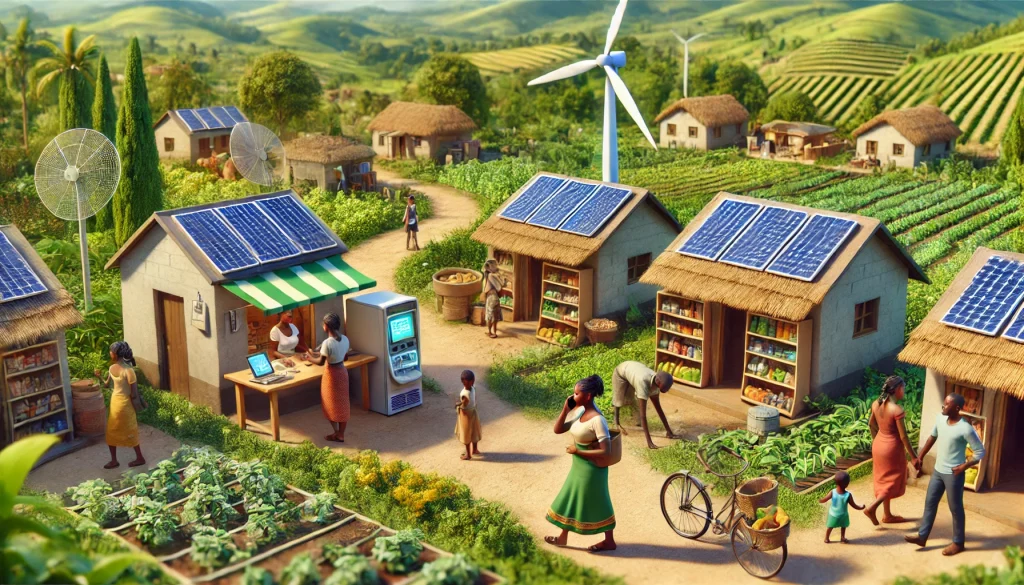In recent years, the demand for sustainable financial solutions in Africa has grown steadily, sparking significant changes across the continent. These solutions are addressing environmental challenges while fostering economic growth by transforming traditional business models. As more investors focus on Africa’s promising markets, innovative financial strategies are paving the way for development. This article explores how sustainable financial solutions are reshaping Africa’s economy and supporting ethical innovation.
African nations are increasingly adopting green finance initiatives and sustainable investment strategies, essential for navigating global markets. With a young and dynamic population, Africa offers opportunities for business models aligned with global sustainability trends. By focusing on long-term environmental, social, and governance (ESG) goals, businesses are integrating sustainability into their core operations.
Sustainable financial solutions boosting economic growth

Sustainable financial solutions in Africa are key drivers of economic development through innovative business strategies. These approaches blend financial viability with environmental awareness. By investing in renewable energy and sustainable agriculture, African businesses are using natural resources more efficiently.
Additionally, these financial practices support local businesses and generate employment. Microfinance and impact investing have led to a rise in entrepreneurship, especially in underserved communities. This not only creates jobs but also improves living standards and reduces poverty.
International partnerships also expand the reach of these solutions. Collaborations with global financial institutions bring valuable resources and expertise, helping scale sustainable business models. These partnerships reinforce the continent’s position in sustainable innovation and help drive inclusive growth.
Renewable energy investments reshaping the continent
Renewable energy is at the heart of Africa’s sustainable financial strategy, driving both economic and environmental progress. Investments in solar, wind, and hydroelectric projects are supplying more communities with reliable energy. The success of these projects is supported by international partnerships that provide funding for large-scale infrastructure. Such initiatives help African countries use their natural energy resources responsibly.
These efforts meet rising energy demands and show how sustainable finance can lead to transformative development. With more countries prioritizing renewables, Africa is emerging as a global player in clean energy. Policy frameworks are evolving to support green investments and innovation. These changes are laying the groundwork for a sustainable and self-sufficient future.
Microfinance and impact investing empowering local businesses
Microfinance and impact investing are central to the continent’s approach to sustainable development. These financial tools provide crucial support to small and medium-sized enterprises (SMEs), helping them compete in broader markets. Microfinance institutions play a key role in offering services in rural and underserved areas, driving financial inclusion and local development.
Impact investing attracts private capital to projects that deliver both financial and social returns. In Africa, funds are supporting sectors like education, healthcare, and clean technology. These projects improve lives while generating returns, proving that sustainability and profitability can go hand in hand. By promoting inclusive financial models, these tools strengthen local economies and enable African businesses to engage globally. This creates a more diversified and resilient economy, capable of adapting to future challenges.
Challenges and opportunities in implementing sustainable models
Despite progress, African nations face challenges in expanding sustainable financial models. Limited infrastructure, regulatory hurdles, and lack of capital often slow implementation. Addressing these issues requires government support and effective policy-making focused on long-term sustainability.
Nonetheless, opportunities for growth remain vast. Africa’s young population and abundant resources offer huge potential for innovation. Supporting entrepreneurship and adopting digital technologies like fintech can further unlock these opportunities. Cooperation among governments, businesses, and international bodies will be key. With the right support and strategy, Africa can achieve inclusive and sustainable growth that serves as a global model.
Governmental support and policy frameworks
Government action plays a crucial role in expanding sustainable finance. Strong policies and incentives attract investments aligned with environmental and social goals. Measures promoting energy efficiency and social inclusion help create a stable investment environment. Partnerships between public and private sectors are essential for supporting sustainable entrepreneurship.
Transparent and reliable legal frameworks further build investor confidence. African governments are increasingly making sustainability a national priority, recognizing its long-term benefits. Institutional strengthening is also vital, ensuring that policies translate into real impact and sustained growth. By aligning local priorities with global development goals, governments can use financial tools to achieve lasting socio-economic progress. Their role is central in building an environment where sustainability drives innovation and resilience.
Future prospects for sustainable financial solutions
The future of sustainable finance in Africa is bright, supported by innovation and a growing commitment to sustainability. Digital finance, renewable energy, and eco-friendly agriculture are set to transform business across the continent. As these solutions become more integrated into economic strategies, Africa’s potential for growth expands.
By investing in people, protecting natural resources, and forming strong partnerships, African nations can shape a prosperous and sustainable future. These solutions offer a clear path for addressing global challenges while promoting inclusive development. In conclusion, sustainable financial solutions are essential for Africa’s development journey. With continued focus on innovation and cooperation, these models will guide the continent toward lasting prosperity and inspire other regions to follow.



